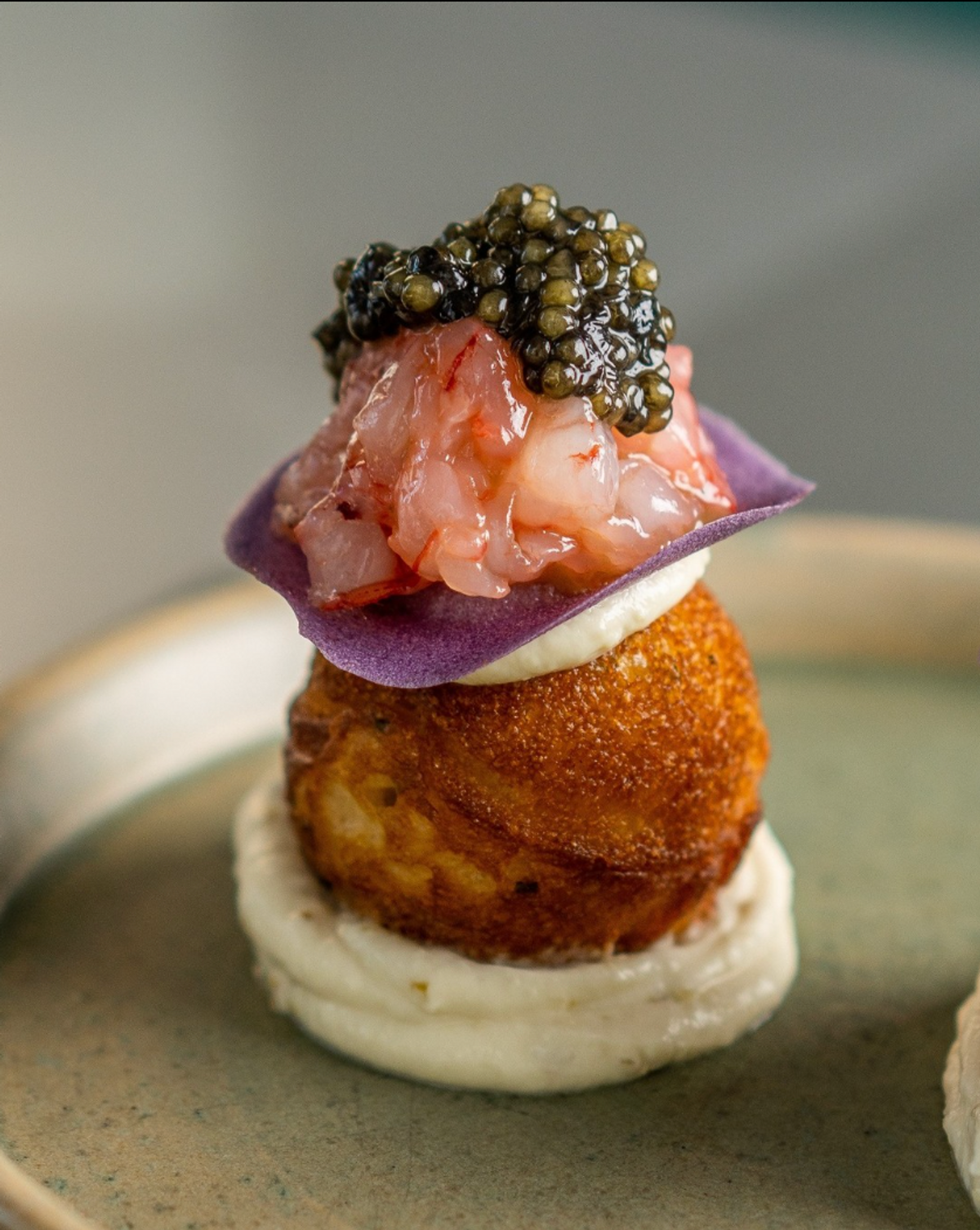Israeli Restaurants Reach for the Star
Chefs and diners await the debut of the country’s Michelin guide




Outshone by politics and economics, food rarely makes headlines in Israel. But in November 2022, the country was abuzz with a culinary scoop: The Michelin guide, which ranks the world’s best restaurants with stars and mentions, is on its way to Israel. For the small nation, the news was big—and met with both excitement and anxiety.
The Michelin guide has been around since 1920 and, over the years, has morphed from a road-trip guide in booklet form, issued by the French tire company Michelin, into a popular resource that can propel fine dining chefs into financial success and stardom. Israel, to date, has been absent from the guide altogether. While its influence on the global culinary scene is often a topic of debate, the guide is still considered, by the restaurant industry and those who follow it, an important and lucrative institution—important enough for governments and cities around the globe to invite Michelin to rank their restaurants, for a hefty price tag.
In the past, the guide would tackle different countries and cities on its own initiative; this is still the case in popular dining destinations like France and Italy, and large cities in the U.S. Yet in recent years, it has become a practice for tourism boards of countries not as prominent on the culinary map to commission the guide with the intention to draw attention and traveler dollars to local gastronomy—such governments in the past have reportedly included South Korea, Thailand, and Singapore. In Israel, former Minister of Tourism Yoel Razvozov decided to follow their path.
“Once I entered this important ministry, it became clear to me that we ought to realize Israel’s potential when it comes to food and wine tourism,” Razvozov said. “These are very developed fields in Israel, and it was important to me that it will be known that there are Michelin-starred restaurants in the country, that there would be a guide for us at the very least.”
Razvozov, an immigrant from Russia, and a relatively young and unknown politician, assumed the governmental post in 2021 when, after yet another election cycle, his Yesh Atid party came to power. Soon after assuming the role, his office had reached out to the French representatives of the guide and initiated a negotiation process. According to the televised segment that broke the news, the two options were a five-year contract for 2 million euros ($2.2 million), or a three-year contract at the cost of 1.5 million euros ($1.6 million), with the latter being chosen in the end. “We’re in the last leg of the process,” said Razvozov. “It can be a matter of weeks.” Once the contract comes through, the guide should start seeking out restaurants to feature. The contract focuses on issuing a Michelin guide for Israel, with mentions of the best local restaurants. There’s no obligation to hand out stars, but if the guide’s representatives find restaurants that answer the appropriate criteria, stars will be given.

In a late December follow-up to the initial news on Israel’s TV Channel 12, the encouraging timeline was supported by showcasing an official document from Michelin, stating the preliminary agreement terms. The government had changed yet again in recent months, but Razvozov says that new Minister of Tourism Haim Katz has been made aware of the project’s importance and will only have to give it the blessing of a final signature.
A few Israeli chefs have already tasted Michelin recognition, but only outside of Israel: Israeli-led restaurants with a star include Prism in Berlin and the Parisian Shabour by chef Assaf Granit. A countrywide acceptance into the Michelin guide—at whatever price—may mean a lot to Israel, both financially and politically. “I have no doubt that this would increase culinary tourism to Israel and bring money to the Israeli economy,” said Razvozov.
Indeed, in 2017, the world-renowned chef Joel Robuchon stated that one Michelin star equals about 20% more business, two stars lead to a 40% increase, and three stars to a 100% increase. In various studies on the effect of Michelin on gastronomy tourism, it has been found that inclusion in the guide can result in as much as a 25% increase in tourism; Thailand had evaluated its Michelin debut at a 10% increase.
But, beyond the monetary significance, the Michelin guide equals recognition like no other. Politically, there’s never been a better time. “I can assume that the recent Negev Summit, as well as the signing of the Abraham Accords in 2020, had contributed to the political stature of Israel and have expanded the financial options,” said Razvozov. In recent years, Michelin has been favoring the region in general, entering Dubai and Turkey in 2022. It is also, for those who aren’t into regional politics, simply a stamp of global prestige.
If restaurateurs see that being consistently great might lead to a Michelin star and a full restaurant, they’ll aim for the star.
“A Michelin star is still very much a status symbol and the few restaurants in Israel that do fine dining really want it, as a verification to what they aim to showcase,” said Amit Aaronsohn, a prominent Israeli food journalist and podcaster. “The common perception is that Michelin automatically puts you on the radar of foodies in the world, and while we like to think of ourselves as a culinary capital, we’re still far from being one on a world-class level.” According to Aaronsohn, the entrance of Michelin into the country will cement its status in a new, prominent way: “Let’s say it will be much easier for Netflix to do an episode of Chef’s Table in Israel once that happens.”
Aaronsohn also notes that while, in the past, it has been claimed that a lack of consistency and service quality had separated Israel from its Michelin stardom, the Bib Gourmand—the guide’s more relaxed system of highlighting and recommending more casual eateries—has been awarded, in other countries, to hawker stalls and street food vendors that aren’t necessarily buttoned-up. “In that sense, our street food definitely delivers on the experience,” he said. “It will be interesting to see what happens with the Michelin guide here in that category.”
Will Israeli diners care? “There’s a big difference between the approach of Israelis who go abroad to dine at upscale restaurants and Israelis who simply want to go out in their own backyard,” Aaronsohn said. “One of the characteristics of a Michelin-starred restaurant is ceremonial and meticulous service—it’s a whole new set of rules the Israeli diner isn’t cut out for on his home turf.”
However, while the awareness of Michelin’s importance in Israel is still in its infancy, among those few establishments Aaronsohn had described—the Israeli restaurants that will serve you an artful tasting menu and fold your napkin after you leave for the restroom—the excitement is peaking. Soon after the news broke, speculations about potential star recipients began in the local media, name-checking such beloved institutions as A Restaurant and the kosher Animar. One restaurant that has been in the center of the Michelin guessing game is the new Hiba, led by chef Yossi Shitrit. Hiba opened in early 2022, with a reported investment of 7 million shekels (close to $2 million), serving a locally inspired, 14-course tasting menu to 35 diners at a time. It is perpetually booked, even with two sittings a night. Upon opening, Shitrit had announced in a TV segment that he’s aiming for Israel’s first Michelin star. “Everyone had raised their eyebrows back then,” he said. “But now it might become a reality.”
According to Shitrit, what “makes” a Michelin-worthy restaurant is the focus on high-quality ingredients, and detailed service—“less noise on the floor.” Bringing the guide to Israel, Shitrit says, will not only attract tourism interest, but will improve the standard of Israeli dining from within. “This will create a huge boost in striving for excellence,” he said. “If restaurateurs see that being consistently great might lead to a Michelin star and a full restaurant, they’ll aim for the star.”
Flora Tsapovsky is a San Francisco-based food and culture writer.